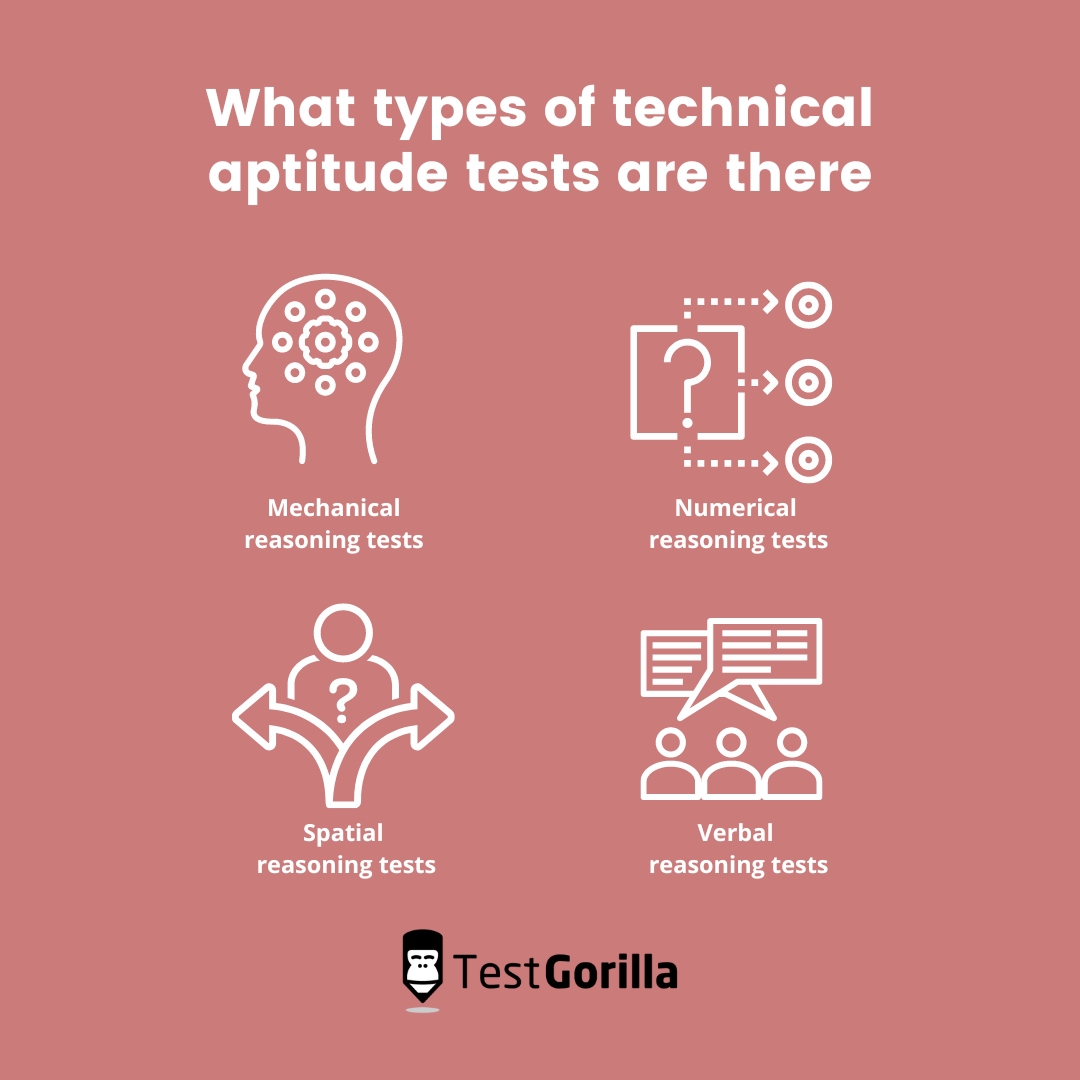Long gone are the days when you could simply take a look at candidates’ CVs and pick a couple of the most promising applicants for a job interview. Today, the average open role gets more than 200 applications, and you would be swamped if you invited everyone for an interview.
That’s why many companies have started implementing pre-employment tests in their hiring processes to easily screen out unqualified candidates. Pre-employment tests are particularly useful for evaluating candidates’ technical aptitudes.
But what are technical aptitude tests, why should you use them, and what are their benefits? In this article, we’ll answer all of these questions and many more. Let’s get started.
Table of contents
What are technical aptitude tests?
A technical aptitude test is designed to help you assess and evaluate candidates’ technical skills and abilities. You give out the test to candidates when you want to assess their technical skills and whether they have the knowledge needed to solve the complex problems they will be facing on a daily basis in the role.
Giving applicants a technical aptitude test is a must when hiring for any of the following roles:
Emergency roles
Law enforcement and military positions
Engineering and construction jobs
Trade jobs, such as plumber, electrician, and mechanic roles
When hiring for any of these roles, you should give the candidates a technical aptitude test to accurately evaluate their abilities.
What types of technical aptitude tests are there?
There are many types of technical aptitude tests. You don’t have to use only one type; you can select multiple test types as part of a skills assessment to evaluate your candidates thoroughly.
Also, you don’t have to create these tests from scratch. You can use candidate assessment platforms like TestGorilla to help you find the best applicants.
Whichever technical aptitude tests you select, all fall under the following four types:
Mechanical reasoning tests
A Mechanical Reasoning test evaluates applicants’ knowledge of basic mechanical concepts, such as velocity, pulleys, levers, gears, and wheels.
Candidates should score well on this test if they are applying for any of the following roles:
Facility maintenance staff
Equipment installation technicians
Electricians
Welders
Plumbers
Carpenters
Machine operators
Machinists
Automotive mechanics
Technical salespeople
Engineering roles, such as mechanical, electrical, aerospace, or civil engineers
Numerical reasoning tests
A Numerical Reasoning test assesses candidates’ basic aptitude with numbers. Although a Numerical Reasoning test differs from a math test, applicants still need to know how to interpret numbers, percentages, and fractions, analyze graphs and charts, and understand number patterns and tables.
Applicants who succeed on this test may be suitable for the roles below:
Auditors
Financial analysts
Accountants
Any other role that requires good numerical reasoning skills
Spatial reasoning tests
A Spatial Reasoning test shows you candidates’ understanding of 2D and 3D objects in space. It tests their knowledge of concepts such as mental rotation, mental folding, spatial working memory, and spatial visualization.
It’s imperative to give this test to candidates applying for any of the following roles:
Mechanical engineers
Chemical engineers
Researchers
Designers
Architects
Any other STEM jobs in your organization
Verbal reasoning tests
A Verbal Reasoning test evaluates candidates’ ability to make logical connections between words and draw accurate conclusions based on that information. It will help you determine if they can find analogies in text and understand premises and inferences.
Any candidate applying to work in the following roles should complete a Verbal Reasoning test:
Legal positions
Engineering jobs
Consulting roles
Executive positions in any industry, especially in the financial and banking sectors
Civil service jobs, like legislators, teachers, and health care professionals
Here’s why you should create a pre-employment assessment with TestGorilla
With TestGorilla, you can create a pre-employment assessment that includes up to five tests. This enables you to assess not only candidates’ technical aptitude but also their other skills and qualities, giving you a comprehensive view of their abilities.
Here are three reasons why you should use TestGorilla’s pre-employment assessments in your hiring process:
They’re bias-free
When you use TestGorilla’s pre-employment tests, you won’t have to worry about bias in your hiring process. You simply send all of your candidates the tests and wait for the results. The test results are numerical, so you can easily compare candidates to see who did better on the test.
In contrast, CV screening requires you to go through dozens or hundreds of resumes and decide which candidates to shortlist and invite to an interview. Further, you won’t know if the shortlisted candidates are actually the most qualified or if unconscious biases have affected your decisions.
But with TestGorilla’s pre-employment tests, you’ll never have to worry about bias again in the hiring process.
They’re a scalable solution
These days, CV screening isn’t a scalable hiring method. The problem is that the average job opening gets around 250 applications, so it would take you an unreasonable amount of time to evaluate each CV thoroughly.
Take into account that a lot of them will be from unqualified candidates who send their resumes to any open job in the market, and you have a hiring manager’s nightmare. It’s no wonder recruiters spend an average of just 7.4 seconds skimming each CV.
But with TestGorilla’s pre-employment tests, you can find the best of all those applicants much more efficiently. It takes the same time to send the test to every candidate, no matter whether you receive 20 or 220 applications.
They’re easy to use
Our pre-employment tests are easy for both recruiters and applicants to use and only take an average of 10 minutes for candidates to complete.
If they do well and get a great score on the test, you can invite them for an interview. And if they do poorly, you can screen them out of the hiring process before the interview stage.
With CV screening, it’s more difficult to tell whether candidates actually have the skills they write in their resumes. When shortlisting applicants, you may end up with many false positives and false negatives.
TestGorilla’s pre-employment assessments are a simpler recruitment method that eliminates doubt from the hiring process.
Use pre-employment technical aptitude tests
To find the most relevant pre-employment tests for your open roles, take a look through our test library. It has more than 260 scientifically created tests, such as the Problem Solving test and Reading Comprehension test.
Don’t leave your hiring process to chance; sign up for your free plan today to use pre-employment technical aptitude tests and hire the best candidates for your business.
Related posts
Hire the best candidates with TestGorilla
Create pre-employment assessments in minutes to screen candidates, save time, and hire the best talent.
Latest posts
The best advice in pre-employment testing, in your inbox.
No spam. Unsubscribe at any time.

Hire the best. No bias. No stress.
Our screening tests identify the best candidates and make your hiring decisions faster, easier, and bias-free.
Free resources
This checklist covers key features you should look for when choosing a skills testing platform
This resource will help you develop an onboarding checklist for new hires.
How to assess your candidates' attention to detail.
Learn how to get human resources certified through HRCI or SHRM.
Learn how you can improve the level of talent at your company.
Learn how CapitalT reduced hiring bias with online skills assessments.
Learn how to make the resume process more efficient and more effective.
Improve your hiring strategy with these 7 critical recruitment metrics.
Learn how Sukhi decreased time spent reviewing resumes by 83%!
Hire more efficiently with these hacks that 99% of recruiters aren't using.
Make a business case for diversity and inclusion initiatives with this data.




















